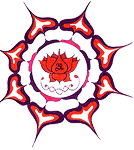
SAFE USE OF HERBS IN PREGNANCY
by Rick Clofine, D.O.
My interest in the safe use of healing herbs has developed slowly over the last 25 years. My first experience in herbal medicine was many years ago on a road trip from Colorado to Pennsylvania. Traveling by van, with a number of friends, I was offered a remedy for constipation. “Brew a tea”, I was told. Unfortunately, no one knew, or at least told me, how much of the Senna to use. The results were explosive to say the least! Thus my first lesson in respecting the power of herbal medicines was learned.
As I became a husband and father, and trained as an Osteopathic Physician and then as an Obstetrician/Gynecologist, I continued to maintain an interest in the natural sources of many of the medications I was learning about. Always enjoying gardening, I began to grow and use a select few culinary and medicinal herbs. Not having an herbalist teacher, I found the best way to learn about a plant was to read about it, grow it and use it. Over the subsequent years I have slowly felt more comfortable recommending botanicals to patients. This process has been greatly hastened by meeting and working with herbalists I like and respect. Plants have personalities, spend some time and get to know them. Most are gentlepeople, but watch out for the few ruffians in the crowd. They are but one fruit of Mother Earth’s bounty.
Herbs are not pharmaceutical medications. Herbs are parts of whole plants, not isolated or synthesized chemicals. Herbal effects have to do with the synergistic actions of nature’s formulations. Hundreds of different compounds, combined and stored in a very specific way. Drugs and herbs are used differently. Both can be extremely beneficial when used appropriately. There are limited scientific studies that can guarantee the safety of either one in pregnancy. Anecdotal reports are used to make estimates of the relative risk and safety of these compounds in pregnancy. Respect and care should be utilized, along with good common sense and moderation, in the use of any healing substance. The use of conventional and herbal medicine does not have to be mutually exclusive activities. Truly wholistic medicine utilizes many therapies and technologies from a balanced healing perspective.
The question of herbal safety is greatly magnified when pregnancy is involved. Pregnancy can be a challenging transformative time. A time of change on all levels of being. Hopefully, a conscious manifestation of a couples love. It also can be a time of confronting our greatest fears. Fear of the unknown, fear of losing control. Pregnancy covers all those bases well. In addition, there aren’t many things more important to most people than building their families. Conventional medical practice sometimes reinforces this by trying to motivating people out of fear.
Utilizing herbs can be the first step toward accepting greater responsibility for your own health and well being. It can be a move toward re-connecting with the bodies natural healing power and the healing rhythm’s of Mother Earth. Moving not out of fear, but toward beauty and vitality. With such important concerns, we want to accept those challenges with good intent, based on accurate information and a balanced perspective. Tempering age old wisdom with today’s scientific knowledge. The following general recommendations will hopefully assist you in feeling safe with our herbal allies. These are very conservative recommendations, a master herbalist might feel more comfortable using some of these herbs.
HERBS TO AVOID IN PREGNANCY
Herbs used traditionally to stimulate menstruation (emmemnagogue’s)
These may stimulate the smooth muscle of the uterus and may thus pose a risk. While no herbal formula has been shown to be a reliable abortifacient (agents to induce abortion), it is best to err on the side of caution and avoid any plants with a history of such use.
- Angelica
- Celandine
- Goldenseal
- Shepard’s purse
- Barberry
- Dong Quai
- Motherwort
- Southernwood
- Black Cohosh
- Ephedra
- Mugwort
- Tansy
- Blue Cohosh
- Feverfew
- Rue
- Yarrow
Alkaloid containing herbs
Alkaloids are a diverse group of chemical plant constituents that have a wide range of pharmacological impact upon the body. Sometimes these compounds are very potent and have been isolated as medications or have been identified as the active ingredients of many visionary plant teachers. These are best avoided in pregnancy.
- Autumn crocus
- Broom
- Comfrey
- Mandrake
- Barberry
- Coffee
- Goldenseal
- Tansy
- Blood root
- Coltsfoot
- peyote
Comfrey, Coltsfoot and Tansy give a good example of tempering folkwisdom with science. These plants have been shown to contain liver-toxic and potentially carcinogenic agents. Most modern herbalists do not recommend they be used internally..
Oil Containing Plants and essential oils
Some essential oils are potentially very dangerous to the pregnancy if taken internally during pregnancy. All essential oils should be treated with great respect and appropriately diluted for the intended use. Essential oils should not be taken internally. Sometimes the whole plant used in moderation is relatively safe, but exceptions to this exist and it is best to avoid any ingestion of the following plants.
- Arbor Vitae
- Juniper
- Pennyroyal
- Nutmeg (in large amounts)
Anthraquinone Laxatives
These compounds are very potent stimulators of bowel peristalsis (the muscular waves which move bowel contents along) thus making them potent laxative agents. Overstimulation of the bowel (such as in diarrhea, enemas or laxative use) or inflammation of the bladder (such as in bladder infection) are known to irritate the uterus in sensitive women and cause premature labor.
- Alder buckthorn
- Cascara Sagrada
- Purging buckthorn
- Senna
Herbs thought to have an effect on the hormonal system
- Ginseng
- Licorice
HERBS TO ENJOY IN PREGNANCY
In general, the safest herbs to use during pregnancy are those considered food or tonic herbs. These herbs are used as food and can be eaten on a daily basis without toxic concerns. They may be taken in capsule form or used as a tea or infusion. Always seek the most reliable source of fresh herbs possible. I encourage the use of organic herbs. The respectful and responsible use of herbs requires us all to become sensitive to where our herbs come from and how they are harvested. Certain popular herbs are environmentally threatened (such as goldenseal). If collected from the wild, it should be done in a responsible manner.
There is a long anecdotal history of beneficial use of these plants in pregnancy. Red Raspberry leaf is a favorite of most herbalists for use during pregnancy. The following plants each deserve an article of their own.
- Chamomile flowers
- Dandelion greens & root
- Ginger root (zingiber officinale, not wild ginger (asarvm canadense)
- Nettle leaf
- Oat straw stalk
- Raspberry leaf
- Strawberry leaf
- Peppermint leaf
- Slippery elm bark
The following Essential Oils can safely be used in aromatherapy during pregnancy. Essential oils should always be used carefully and well diluted. They should not be ingested or used internally. They can be placed in an aromatherapy diffuser or in potpourri. Several shakes into a pot of steaming water makes a good steam inhaler (wrap a towel over your shoulders and heat, be careful of the hot pot and water). Shake somemore into your bath for a fragrant retreat. A cotton ball with some oil placed in a film canister can be easily carried in pocket or purse.
- Chamomile
- Tangerine
- Grapefruit
- Geranium
- Rose
- Jasmin
- Ylang-Ylang
- Lavender
These herbs and oils can be good friends when visited in moderation. A good woman’s herbal text will have recommendations. A nice tea for morning sickness is red raspberry leaf and peppermint with 1/4 teaspoon fresh grated ginger root, sweeten with honey if desired. Take the time to get to know your herbal friends. If you spent 1-2 months on each herb, using and learning about it, you would have 6-8 lifelong friends at the end of a year.
Herbal Resources
The Natural Pregnancy Book by Aviva Rom. Crossing Press, 1997.
My favorite practical natural pregnancy book by a knowledgeable mom, herbalist, midwife.
Herb Research Foundation 1007 Pearl Street, Suite 200, Boulder, CO 80302
HerbalGram published by The American Botanical Council, P.O. Box 201660, Austin, TX 78720
Herbal Healing for Women, Simple Home Remedies for Women of All Ages
by Rosemary Gladstar (Fireside, 1993)
The Wise Woman Herbal for the Childbearing Year, by Susan Weed (Ash Tree, 1987)
The Healing Herbs, by Michael Castleman (Rodale, 1991)
Planetary Herbology, by Michael Tierra (Lotus Press, 1988)

![]()
Home ![]() Intro
Intro ![]() Medicine Pages
Medicine Pages ![]() Moontime & Menopause Medicine Wheel
Moontime & Menopause Medicine Wheel
Ritual & Ceremony ![]() Temple of Health Radio Show
Temple of Health Radio Show ![]() Links & References
Links & References
![]() Events
Events ![]() Divine
Light Farms
Divine
Light Farms ![]()

